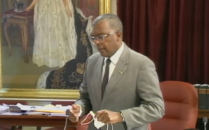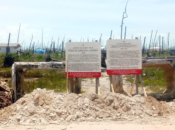“It is the job of the minister and his government to find the right balance”
NASSAU, BAHAMAS — Former Immigration and Foreign Affairs Minister Fred Mitchell yesterday urged the government to find the “right balance” in managing unregulated shantytowns and following its international treaties.
Mitchell’s comments come days after United Nations human rights experts called on The Bahamas to halt planned demolitions of approximately 600 homes in unregulated settlements on Abaco.
The experts cited health and humanitarian concerns that “the community of largely Haitian descendants and migrants numbering up to 2,000 people, including many women and children, are at serious risk of becoming homeless as a result of the clearance expected to take place”.
The government was expected to tear down those structures yesterday, however, there was no movement on demolition.

Mitchell said: “The government must be cognizant of international treaty obligations and the laws of The Bahamas.
“The government must act in conformity with those treaties and laws.
“It must also be sensitive to the human condition.”
Mitchell noted that while the government might resolve one problem and create another larger problem of homelessness, unregulated housing is a cause of concern that can cause public health issues.
“It is a very difficult balancing act,” he said.
“It is only in this context that the law must take its course. It is the job of the minister and his government to find the right balance.”
Hurricane Dorian pounded the islands of Abaco and Grand Bahama between September 1 and 3, 2019, claiming the lives of a confirmed 74 people and displacing thousands, many of whom resided in shantytown communities on Abaco.
The Category 5 storm destroyed the two largest of the six shantytowns on the island — The Mudd and Pigeon Peas.
Following the storm, the government issued an order with immediate effect preventing anyone from building or developing in The Mudd, Pigeon Peas, Sandbanks and The Farm.
Despite its intentions pre-Dorian to clean up shantytowns across the country, there was a challenge with getting residents out of the Farm community in the aftermath of the storm.

Final eviction notices were affixed to homes in the shantytown in English and Creole last week, and Minister of Public Works Desmond Bannister indicated that the demolition of those structures will move forward.
Responding to the calls from the UN, Immigration Minister Elsworth Johnson said the government’s decision is in the best interest of The Bahamas.
He said it was surprising, however, that the UN said nothing about the conditions in Haiti, which “create the propensity for loving people to move from their country”.
According to Johnson, The Bahamas has done a very good job at applying its laws.
A Supreme Court judicial review of the shantytown matter is ongoing.


